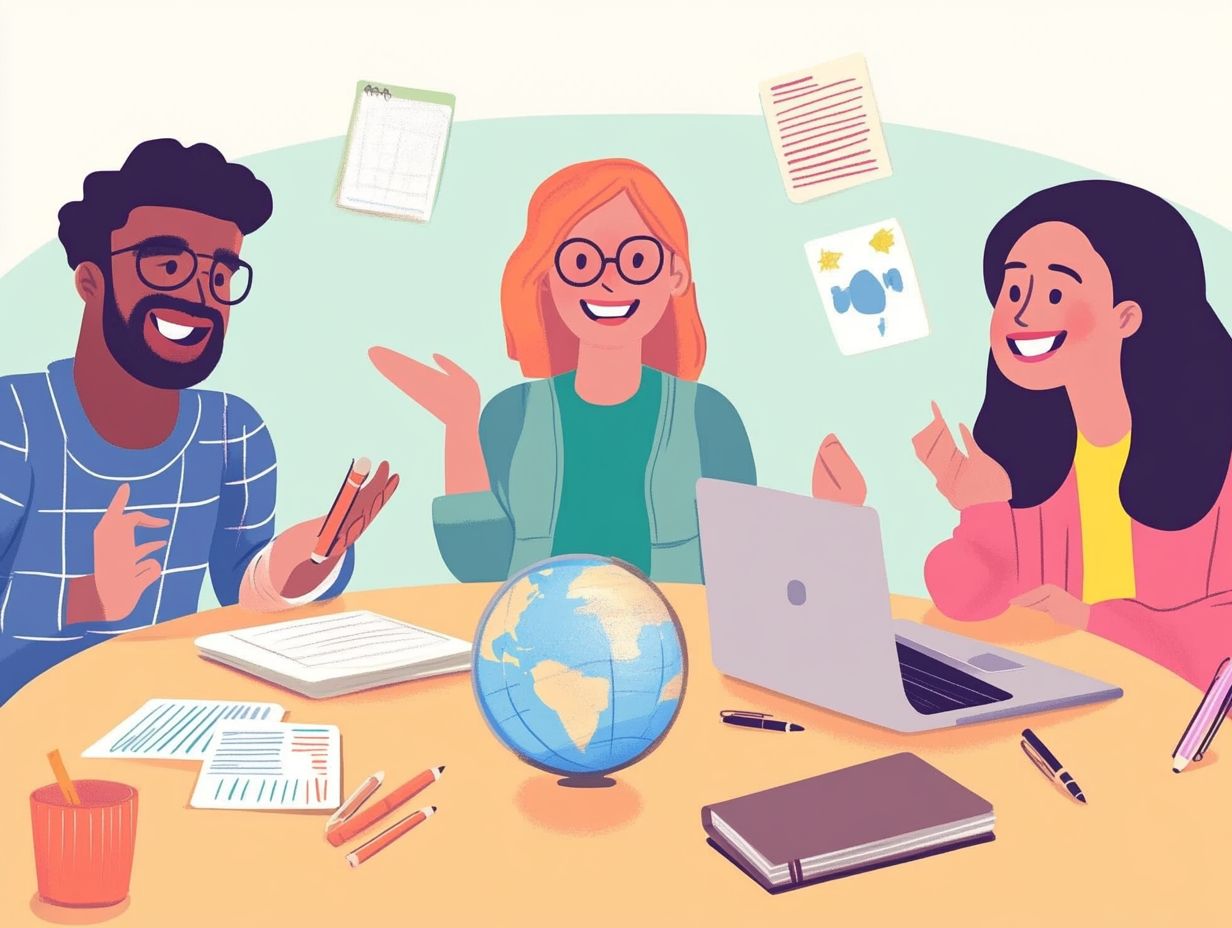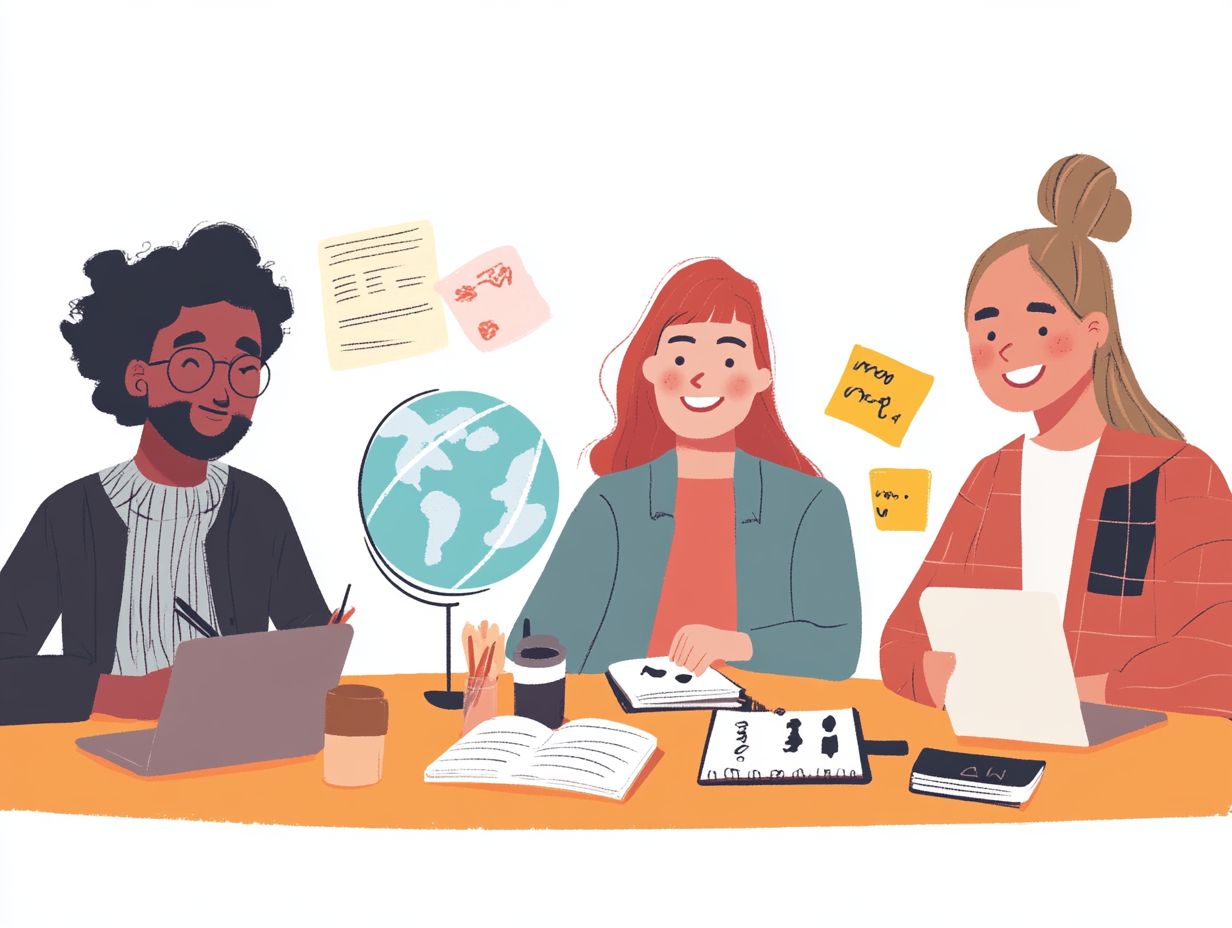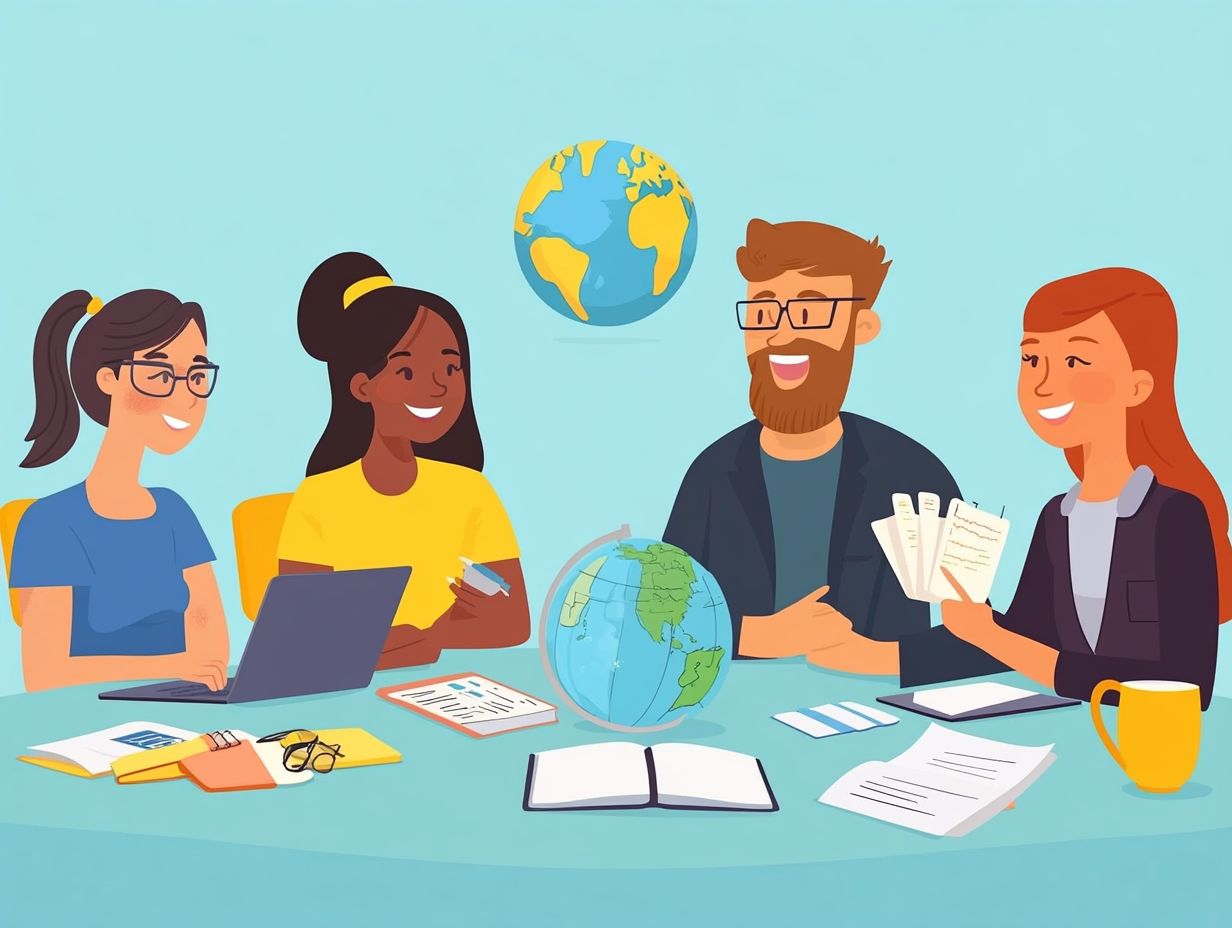What Are the Best Ways to Learn a New Language?
Learning a new language can truly open doors to vibrant cultures, enhance your career prospects, and sharpen your thinking skills.
With a plethora of methods at your disposal, how do you determine the right approach for you? This article delves into effective language learning strategies, such as immersion, online courses, and language exchanges.
This guide will help you select the best method tailored to your learning style while assisting you in setting realistic goals. It also addresses common challenges and provides valuable tips for maintaining your newly acquired language skills.
Get ready to dive into an exciting new adventure!
Contents
- Key Takeaways:
- The Most Effective Methods for Language Learning
- Tips for Choosing the Right Language Learning Method
- Overcoming Challenges in Language Learning
- Maintaining Language Skills
- Frequently Asked Questions
- What are the best ways to learn a new language?
- How can immersion help in learning a new language?
- Is practicing with native speakers necessary for learning a new language?
- What role do language learning apps or software play in language learning?
- Are taking classes beneficial for learning a new language?
- How important is regular practice in learning a new language?
Key Takeaways:

- Immersion is the most effective method for learning a new language, as it allows for authentic language practice.
- Consider your learning style and set realistic goals when choosing a language learning method to ensure success and motivation.
- To maintain language skills, continue practicing and learning through methods such as language exchanges and online courses.
Why Learn a New Language?
Learning a new language opens up a treasure trove of opportunities, enhancing your thinking skills and fostering personal growth. It s not just about improving your communication skills; it also enriches your appreciation of different cultures.
Mastering a language is a valuable asset that can elevate your career prospects, expand your social circles, and deepen your understanding of diverse perspectives. By embracing challenges like making mistakes and actively seeking feedback you cultivate resilience and adaptability.
Engaging with real-life resources, such as podcasts and children’s books, solidifies your learning while making the journey enjoyable and effective. Acquiring new vocabulary is particularly vital, as it forms the bedrock of effective communication.
When you encounter new words in context, you grasp their nuances, allowing you to use them intuitively in conversations. Mistakes be it mispronunciation or grammatical slip-ups often transform into powerful learning moments, enriching your understanding.
Engaging in language exchange conversations or joining local language clubs provides excellent opportunities for practice. Utilizing mobile apps designed for language learning offers instant feedback, giving you the power to correct errors and enhance your pronunciation.
This multifaceted approach nurtures your linguistic abilities and enriches your social interactions, opening doors to a world of connections.
The Most Effective Methods for Language Learning
When you explore effective language learning methods, it’s crucial to blend immersive and structured approaches that resonate with your personal study plan. Immersive learning, where you engage with the language through real-life experiences, can significantly enhance your comprehension and retention.
Integrating teaching techniques like conversational shadowing repeating what you hear in conversation and low-stakes practice, which means practicing without fear of mistakes, enables you to cultivate your language skills in a supportive setting. This transforms the acquisition process into an engaging and effective journey.
Immersion
Immersion is a compelling language acquisition method that surrounds you with the target language, significantly enhancing your vocabulary retention and cognitive abilities. This approach involves engaging with native speakers, consuming media in the language, and participating in cultural activities, all of which reinforce your language skills in real-time.
By immersing yourself in the language, you not only expand your vocabulary but also sharpen your cognitive processing of it. Collaborative activities, such as joining conversation clubs or utilizing immersive apps, can dramatically enhance your listening and speaking skills.
Attending language workshops that focus on practical exercises will deepen your understanding and retention. Furthermore, watching movies or reading books in the language offers contextual and situational usage that textbooks often miss, making your learning experience even more enriching and effective.
Start your adventure in learning a new language today, and share your experiences with others!
Online Courses
Online courses present a flexible and effective solution for language learning. They offer structured content that you can tailor to your unique study plan.
These courses often employ memory strategies, enabling you to absorb vocabulary and grammar in an engaging way. You’ll find ample opportunities for feedback, allowing you to correct errors and monitor your progress with ease.
This personalized approach is especially advantageous for those with busy schedules. You have the freedom to choose when and where to study, seamlessly integrating language acquisition into your life.
Many platforms also feature interactive tools like quizzes and conversation simulations, which further enhance your understanding and retention (the ability to remember what you ve learned). The ability to receive real-time feedback boosts your motivation and helps you pinpoint specific areas that require improvement.
All these elements work together harmoniously, making online courses an excellent choice for anyone looking to develop their language skills efficiently and enjoyably.
Language Exchanges

Language exchanges offer an exciting chance to practice with native speakers. This real-life practice allows you to improve your speaking and listening skills in a welcoming environment.
In these exchanges, you can make mistakes and receive immediate feedback, deepening your understanding of the language and its nuances.
This hands-on approach can be genuinely transformative, turning theoretical knowledge into practical application. Tools like Tandem and HelloTalk offer platforms for you to connect with individuals from around the globe, making language practice accessible and enjoyable.
Engaging in these exchanges cultivates fluency (the ability to speak smoothly) and enriches your cultural understanding. You share and explore each other’s backgrounds. Set clear goals today for the best results focus on specific vocabulary or conversational styles and embrace corrections with an open mind, ultimately elevating your learning journey.
Tips for Choosing the Right Language Learning Method
Selecting the ideal language learning method is essential for crafting an effective experience that aligns with your unique needs and preferences. By identifying your learning style be it visual, auditory, or kinesthetic you can greatly impact the success of your study plan.
Incorporating teaching methods that resonate with your style boosts motivation and enhances retention (the ability to remember information), making your journey toward language acquisition both enjoyable and rewarding.
Consider Your Learning Style
Understanding your learning style is crucial for mastering a new language. It allows you to tailor your approach and find the perfect balance of teaching methods that resonate with you.
If you’re a visual learner, you’ll likely thrive when you can see the material laid out in front of you. Incorporating flashcards and infographics can significantly enhance your comprehension and retention of vocabulary and grammar rules.
If you identify as an auditory learner, you ll grasp concepts much better through sound. Engaging with podcasts, music, or lively discussions can make language learning far more effective for you.
For those who are kinesthetic learners, the best results often come from physically engaging with the language. Practices like role-playing or using gestures can infuse energy into your learning experience.
By pinpointing your specific learning style, you can choose practices and resources that truly resonate with you, ensuring a more personalized and impactful journey in language acquisition.
Set Realistic Goals
Setting realistic goals is crucial for your language learning strategy. It nurtures consistency and keeps your motivation soaring. By breaking down your broader language objectives into smaller, manageable tasks, you create a clear study plan that guides your progress.
This method helps you gradually master the language, making learning feel like an exciting adventure! It also makes the journey feel less daunting and allows you to celebrate small victories along the way. Your mini-goals could range from mastering a few new vocabulary words each week to successfully holding a basic conversation with a native speaker.
Consistently reaching these targets builds confidence and a sense of accomplishment, strengthening your commitment to the language over time. Establishing tangible, realistic benchmarks acts as your roadmap, ensuring regular engagement with the material and paving the way for your overall success.
Overcoming Challenges in Language Learning
Confronting challenges in language learning is essential for sustaining motivation and achieving long-term success. Common obstacles, like the fear of making mistakes or struggles to find the right balance in practice, can impede your progress.
By actively seeking constructive feedback, you can navigate your language journey with greater ease and effectiveness.
Facing Common Challenges in Language Learning

Common obstacles in your language learning journey may include fear of making mistakes, an imbalance in practice, and challenges in obtaining feedback all of which can hinder your progress. To navigate these hurdles effectively, you need a proactive strategy that fosters a safe space for mistakes while emphasizing the significance of consistent practice.
Understand that fears often arise from past experiences. Encouraging informal settings helps alleviate anxiety, paving the way for more authentic interactions. To strike a better balance in your practice, incorporate a mix of activities speaking, listening, reading, and writing so that no area goes neglected.
Seek constructive feedback from peers, tutors, or language apps to gain valuable insights into areas needing improvement. Engaging with tools like language exchange partners creates a mutually beneficial feedback loop, enhancing your growth and boosting your confidence in your language skills.
Maintaining Language Skills
Maintaining your language skills is essential for preventing language attrition and ensuring what you’ve learned remains sharp and readily accessible. Incorporating regular practice over time and low-stakes exercises into your routine significantly enhances your retention.
This approach allows for gradual mastery of vocabulary and comprehension, avoiding the pressure associated with high-stakes testing or rigid schedules. Embrace a more relaxed yet effective path to language mastery.
Practicing and Continuing to Learn
Practicing and continuing to learn are essential elements for maintaining your language skills and achieving true proficiency. By employing effective language learning strategies, such as memory techniques (memory aids that help you remember words and phrases), you can significantly enhance your ability to recall vocabulary and apply the language in various contexts.
Incorporating both structured lessons and casual conversations provides a well-rounded approach to language acquisition. Engaging with native speakers through language exchange platforms offers invaluable real-life practice, while utilizing flashcards and mnemonic devices can boost your memory retention.
Immerse yourself in multimedia resources like music, podcasts, and films to create an enjoyable way to stay connected to the language. Consistent exposure and active participation in diverse scenarios foster a deeper understanding, helping you feel more confident when navigating different communicative situations.
Frequently Asked Questions
What are the best ways to learn a new language?
The best ways to learn a new language include immersion, practicing with native speakers, using language learning apps or software, taking classes, and regularly using the language in everyday life.
How can immersion help in learning a new language?

Immersion means surrounding yourself with the language and culture. This method enhances learning by providing real-life practice opportunities.
Is practicing with native speakers necessary for learning a new language?
Practicing with native speakers isn’t necessary, but it can significantly boost your skills. You ll improve pronunciation, learn slang, and get immediate feedback!
What role do language learning apps or software play in language learning?
Language learning apps are a convenient way to learn. They offer various exercises, but don t rely on them as your only resource.
Are taking classes beneficial for learning a new language?
Classes provide structured learning with guidance from a teacher. To get the most out of your learning, combine classes with other methods!
How important is regular practice in learning a new language?
Regular practice is key to retaining and improving your skills. Aim to practice daily and use the language in your everyday life!






